Andy Fuchs
Fuchs Audio Technology/Plush FX Pedals Div.
407 Getty Ave Second Floor West
Clifton NJ 07011 973-772- 4420
www.fuchsaudiotechnology.com/
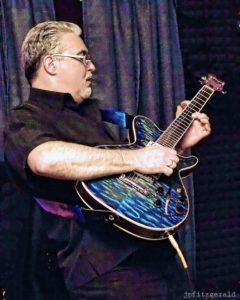 How long have you been a musician? How did you get into it in the first place?
How long have you been a musician? How did you get into it in the first place?
I started messing with a broken old Eminee plastic guitar I found in the basement of my families music store when I was about ten. I guess around 14 or 15 years old I’d been playing flute in the school band (although not at summer camp lol) and got asked to join my buddy Steve’s band to play on Jethro Tull songs. Of course, it was awkward not having anything to do when we weren’t playing Jethro Tull songs, so I was handed an electric bass or a guitar which I got pretty good at. I eventually became the guitar player and the guitar player switched to bass. By time I was 18 my dad got me some gigs (he was a busy club date musician along with my mom). Luckily I could read (having studied guitar, flute, accordion and drums for spell). I never looked back. I played professionally for about 25 years doing weddings, dinner dances, Oktoberfests, etc before taking a break when the business started around 1999. I returned a few years later playing at open mics and jams and using these places as a vehicle to test prototypes, meet musicians and get their feedback and sometimes sell them amps or repair amps for them. I’m now playing with a few musical projects in various genres more for fun than money, which is fine. It’s still a cathartic outlet after a long day in the shop.
Who have been some of your major musical influences, past or present?
Man, I’ve loved so many styles of music and performers ! I grew up in a house where music was a constant. There was always a radio or a record playing at some point. I fell asleep many nights listening to WMCA or WABC on a transistor radio under my pillow. Motown stuck with me, the Beatles, The Stones. I also came to appreciate the tone and playing of guys like Johnny Smith, Howard Roberts, Les Paul, Wes Montgomery. Later on I discovered guys like Vic Juris, Al Di Meola, Holdsworth, (some of these guys who we now work with which is a thrill!) Bireli LaGrene, Jimmy Herring, Mike Landau. Of-course I got into Beatles, Hendrix, Grand Funk, Allman Brothers, Zeppelin, and blues guys like Albert, BB and Freddy King and later Robben Ford, Larry Carlton, Chris Cain….By the way, I hold the distinction that my mom actually taught me how to count “Black Dog”…that weird section where they drop a beat…wow… I still listen to and enjoy many of those same guys, as well as discovering new players by accident or who became customers. Guys like George Walker Petit, Chris Morrison, Bob DeVos, Nat Janoff, Scott Lerner, players who have become friends and whose work I admire.
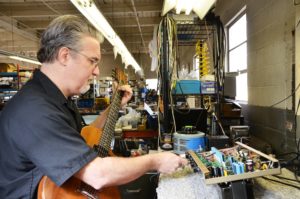 What led to the start of Fuchs Audio Technology? How long have you been in business? How big is your operation/how many employees do you have?
What led to the start of Fuchs Audio Technology? How long have you been in business? How big is your operation/how many employees do you have?
Well, I went through Dr Tube (too much like Dr-Z), Tube King (too much like Tone King) and eventually decided Fuchs Audio Technology represented not only my name but my ideals. It was a bold move. My sister said “good luck with that !”.. yes, a few people picked on it or made fun of it. I didn’t care really. I wanted to bring something unique and innovative to guitar amps which had become (in my opinion) too boring and commonplace from a design standpoint. We started things in the basement of my house. I had a day gig and at night I built and repaired equipment for local musicians. We eventually got on the web and that started the growth as now we were getting known globally. I hired a couple of employees who worked at my house while I was out working my real job. I had a sales job so I could work from home and had flex hours, so it was easy to watch what was happening and make sure things were done right.
Eventually we moved to a new shop in Bloomfield out of the house. About 1500 square feet which we outgrew in less than a year. I quit my job and by then had 5 employees and we were sitting on top of speaker cabinets and had shelves having from the ceiling and leaning over while holding up cabinets, chassis, transformers, amps, speakers, and it was a wild time ! About 8 years ago we moved to the current space which is 5000 sq. feet. We now have offices, R&D, a showroom, off street parking and plenty of room to work and grow. The staff is variable. We have 5 full time employees including me and my wife, our director of sales and business development Neil Ziesing, a full time shop supervisor Sean Purcell and a full time amp maker John Ninnivaggi who’s been with us 12 years. We also employ a few part-timers that come in depending on our workload. I’m proud that everyone who works here has bought and or made themselves Fuchs amps because they believe in the company and the products ! We do outsource some things like cabinets and the stuffing of circuit boards when it makes financial sense, but we do most everything in house including a 40 hour burn in on amps. 4 hours on 4 hours off for a week. This has kept our return rate quite low, like 3% or less per month. We’re still small enough that I personally do QC on the amps as well as any repairs that come in because I want to see and know what failed and why to learn from it.
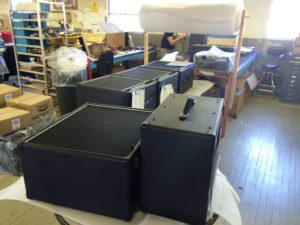 Did you have formal schooling, or are you self-taught? Take us through that story:
Did you have formal schooling, or are you self-taught? Take us through that story:
Welll, Yes and no…lol. I took some pre-engineering in high school. I really had every intent to go to Stony Brook or another hip engineering college. There were a few mitigating circumstances that changed my life journey; I was not terribly great at math back then. (Ironically my sister is an accountant…). AND: The courses required slide rules and would NOT allow calculators ! Of-course I quit and THEN they allowed calculators the year after ! Today most of this stuff is done with software. I’ll design something and run the math on a program and usually fine tune after that. I also discovered from a family friend who taught engineering that they no longer taught anything about tubes. Since I had been playing with tubes and tube circuits since I was 12, worked in the local TV store and doing repair work ALL with tubes, that wasn’t going to work. What would the point be ? I also took off “a few months” which somehow became a few years….somehow I ended up married with two kids and a house…lol. Anyway, I went to work on 48 th street for We Buy Guitars as well as freelancing at other stores around the NYC area. At 18 while taking ET courses at RCA institutes, gigging at night, washing dishes at a restaurant and once I got a taste of cash and a set of wheels, I never looked back. I’ve self-studied a ton starting in the NYC public library, reading army and navy electronics manuals, technical books and articles. Later the internet opened a whole new realm of knowledge and sharing amongst similar gear-heads like me.
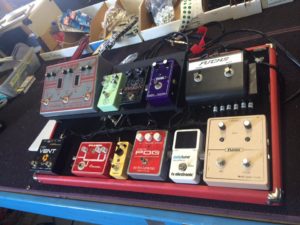 What drives you as far as new pedal creation is concerned? How long does it typically take for an idea to come full circle and become a demo pedal? What’s the process behind new gear, and the eventual release of it to the public?
What drives you as far as new pedal creation is concerned? How long does it typically take for an idea to come full circle and become a demo pedal? What’s the process behind new gear, and the eventual release of it to the public?
When we started the pedal line in 2008 or so, the economy had a major hiccup and suddenly people were not buying as many $ 3000.00 amps as they had been. I decided to diversify and make pedals. I had some ideas and it was time to act on them. What started out as “a few pedals” became over twenty. In all cases we wanted to give each our best shot and our sonic signature. I also like to try to do something different and unique that fills a need. The high voltage tube pedals like the Replay delay combine real tubes at real voltages with a musical sounding digital delay. The dry signal runs through tubes and the mix is done analog. While it won’t do backwards quarter notes or the crazy stuff the digital things do, what it does do is sound like an Echoplex or a Roland tape delay, without the noise, the mechanical limitations of wear and maintenance. Sometimes a pedal is the result of an artist saying what he thinks he needs. BC Kochmit from Eye Empire came to me wanting a pedal that replicated the sound of a certain patch in Pro-Tools for stage use, and I designed the Phone Tone based on that sound. The whole process took maybe 6 weeks? On the other hand the Replay delay and related delay products took a year or two to get right. That was some digital, some analogue, some high voltage switching stuff, quite a feat to package it all, make it stable and sound good too. I have a great friend who does my graphics who’s a musician, so he gets the form and functionality. I do my own electronic and circuit board designs, so we’re lean and mean when it comes to R&D. I outsource things like chassis and cabinets to another drafter locally when needed.
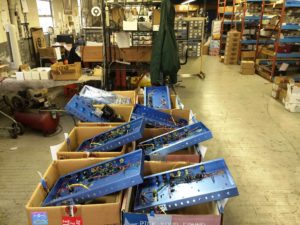 What are some of the biggest concerns facing your profession today?
What are some of the biggest concerns facing your profession today?
Like any business, competition is a big factor. As a small company it’s tough to compete with not only established companies doing cool things, but the constant parade of new “companies” and builders. It seems like every day there’s yet another pedal company showing up with the latest and greatest something. While some builders do have something innovative to bring to the table, others are simply cloning and repackaging, which really makes no sense to me. We do make pedals that are inspired by or designed to sound like a classic Tube Screamer or similar, but we always tweak our designs for less noise, greater articulation and/or flexibility.
The other factor is these pedals when and if they need service, the companies are often aloof or out of business soon after they realize they didn’t really make any money after the dust settled. Some companies do last and prosper, many come and go. We also compete against larger established companies who have many years jump on us as far as having gear out there, name recognition or the financial strength to give away lots of demo pedals to artists. It’s challenging for sure.
Where do you see pedal building going in the future?
We’re always looking at what the next step might or could be. We’re looking at a few different circuit ideas nobody is doing right now that might be game-changing. We are considering also taking some of our technologies into the studio possibly in pro-rack gear and maybe modeling of some of our products with an established player in that field. I am also developing a pedal to reproduce some very unique guitar sounds from the 60’s. We plan to introduce and hopefully in conjunction with the artist who designed and produced those particular sounds. It’s a unique sound not currently on the market from anyone !
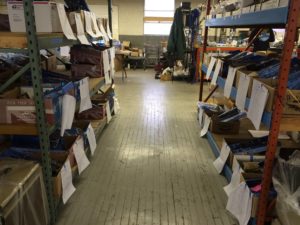 Who are some of your favorite builders in the industry right now?
Who are some of your favorite builders in the industry right now?
I love Robert Keeley personally as well as his work. He’s become a good friend and we often talk in e-mails about circuits, what’s the latest and greatest chip for a given purpose and so on. Over the last year or two he’s been on fire with his new designs. We traded a few pedals back and forth. He collects them, I just play them. His Seafoam chorus actually stopped me from designing a chorus I had started working on! Wampler has an impressive lineup of cool pedals as well. Earthquaker does some cool things too.
Name the last 5 records you listened to:
1. Emitt Rhodes – Rainbow’s End (read his story, listen to his life in music)
2. Bob DeVos – Six String Solos (very sensitive solo guitar pieces)
3. George Walker Petit – Emergence (Love George’s work and production)
4. Al Di Meola – All Your Life and Elysium (two amazing CD’s, love Al and his work)
5. The Monkees – Good Times (an amazing record nobody saw coming!)
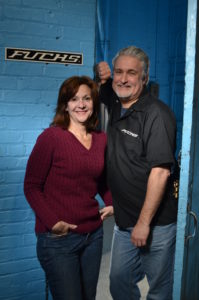 Klon hype: Love it or Hate it?
Klon hype: Love it or Hate it?
Like many products that have become iconic, I guess I’m missing the point or something or I’m too honest for my own good. I like Bill Finnegan personally. We spent some time on the phone talking about the challenges of mass-production and balancing the cache of taking an iconic design to the point you can make money from it. Not unlike Dumble, the crazy asking prices sadly don’t benefit the builder really. In Bill’s case, he’s come out with a new (pedal) answer to the cork sniffers and it looks like it’s become viable and is selling. Of-course he’s going to fight the cloners once again. I thought the Klone was a nice pedal, but for me, (which I stress) it simply didn’t work nor blow me away. It’s obviously a great pedal for some people, I simply wasn’t one of them. You cannot knock the status of that pedal !
Any last comments, or anything you’d like to talk about?
I appreciate the opportunity to chat with you and the kindness you’ve shown to showcasing our products. You provide a cool service to the industry and pedal builders as well. Thanks for the chance to tell our story to your readership.
Thanks so much to Andy for taking the time to answer some questions! Make sure to go check out www.fuchsaudiotechnology.com/, cheers!
GET EXCLUSIVE UPDATES, CONTEST INFO, SEE OUR LATEST DEMO VIDEOS AND MORE:
















